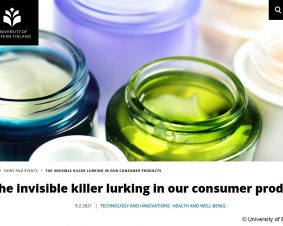 >
Spotlight November 2020: Nanotechnology in the public perception
>
Spotlight November 2020: Nanotechnology in the public perception
In November, we would like to draw your attention to a publication that examines public perception of the safety of nanomaterials in Austria.It shows, that although there is generally a rather positive attitude towards nanomaterials, there are different opinions on safety issues from different social groups. Further clarification seems necessary.
Despite the widespread use of nanomaterials in everyday life, consumer knowledge of the functions, benefits and potential risks of nanotechnology is still limited. As with any developing technology, their public perception has direct implications for future policy and needs to be taken into account by both academia and industry. Within the interdisciplinary research project “Nan-O-Style”, an online survey was conducted with an approach guided by the citizen science community. The main objective was to evaluate the current state of knowledge and attitudes towards nanotechnology in the general Austrian public and to determine how different socio-demographic factors can influence them.
Although Austrians generally have an optimistic and positive attitude towards nanotechnology, there are still concerns about its safety and possible risks. Participants expressed a strong desire for more information about nanotechnology and its applications, as well as for clear labeling and transparency of products containing nanomaterials. A consideration of various sociological factors was also made.
Original Publication::
Isabella A. Jouberta, Mark Gepperta, Stefanie Essa, Reinhard Nestelbacherb, Gabriele Gadermaiera, Albert Duschla, Arne C. Bathkec, Martin Himlya (2020) Public perception and knowledge on nanotechnology: A study based on a citizen science approach. NanoImpact 17. doi.org/10.1016/j.impact.2019.100201

Weitere Spotlights
Spotlight August 2020: The nanoGRAVUR Grouping approach
In August, we would like to present a paper of the German BMBF project nanoGRAVUR. nanoGRAVUR dealt from 2015-2018 with the grouping of nanostructured materials with regard to occupational safety, consumer and environmental protection and risk mitigation. The approach is now described by the project partners in this paper.Due to the variety of synthetic nanomaterials and the numerous modifications (differences in size, shape, chemical composition and surface functionalization), the effort required to investigate effects and behaviour within the framework of regulatory requirements is…
Read moreSpotlight October 2022: The titanium dioxide debate – why the current ECHA and EFSA hazard classification should be questioned
Due to various reports and scientific studies, titanium dioxide (TiO2)was also banned in Europe this year (2022) for use as a food additive with the indication that it could possibly be carcinogenic to humans. Although no case of tumour induction in humans has been reported since the use of this material in micro but also […]
Read moreSpotlight October 2023: Improved hydrogen production through novel catalyst made of three metals
Hydrogen is one of the important energy carriers of the future when it comes to climate-relevant energy supply. For example, surplus electricity from wind turbines or solar plants can be converted into hydrogen, allowing the otherwise unused energy to be stored for longer periods. This hydrogen can be used to power trucks and buses for […]
Read moreSpotlight April 2021: Nanomaterials and Fake News – a commentary based on an example
In February 2021, the article “The invisible killer lurking in our consumer products” appeared, describing nanoparticles as a greater danger than Corona [1]. “The use of nanomaterials” would be “unregulated” and “nanomaterials are so small that they cannot be determined once they are part of a product”. So what is the truth of these statements? […]
Read more


